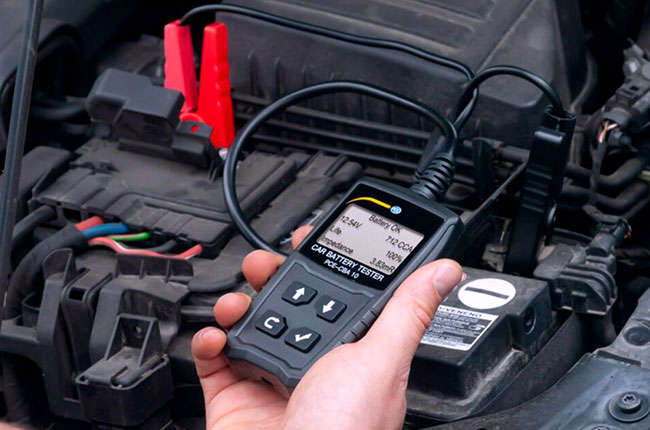
Your car’s battery plays an essential role in your vehicle’s operation. Everything from your starter to pretty much every electronic component is powered by your car’s battery. The usual lifespan of a standard lead-acid battery lasts between 2 to 5 years. One of those key factors affecting its longevity is the hot weather, while running a car’s engine already produces heat, a hot sunny day can also add up to the searing temperature that could severely affect your battery’s lifespan and health, or even worse.
Warm weather could also damage the internal structure of the battery, that is why car batteries in warm climates, such as the Philippines, have a shorter lifespan than in colder climates, however, colder climates drain batteries faster. Generally speaking, batteries do not like temperature extremes. Despite that, you can still take extra care of your battery and prolong its lifespan, just simply follow the 7 tips we’ve listed below.
Tightly fasten your battery

For starters, your car’s battery should be tightly fastened in order to prevent vibration which could potentially damage its internal components and cause short circuits. That said, it is always best to have your battery terminals checked regularly, especially during instances when you’ve gone through uneven or bumpy roads, or haven’t checked in a while.
Control the corrosion on the battery terminals

Your battery terminals should also be cleaned regularly, in order to prevent them from corroding. This is actually another way for you to prolong your battery life, in order to do so, you must scrub the terminals with a toothbrush that’s dipped in a baking soda and water mixture. After that, you must then rinse it with cold water until the mixture is off. Don’t use a hose, just use a small spray bottle.
Make it a habit to test your battery

It’s always handy to have a car battery tester stored inside your car. Just keep it there and get it every time you’re about to perform your regular battery testing. You must check its output voltage level from time to time just to properly keep track of your battery health. The voltage figures could also depict if it’s already time to get a replacement. Typical batteries, when the car is turned off, will have a voltage that ranges from 12.4- to 12.9-Volts.
Avoid using your car’s electronics while the engine is off

This is perhaps, one of the most common mistakes done by car owners. When the engine is turned off, it’s not a good idea to go on accessory mode and activate any of its electronics as it could sap your battery power. Aside from that, extended periods of idling could also harm your battery life given enough time.
Limit your short-distance drives

When planning a short distance trip, perhaps it’s better to take a walk if manageable or perhaps find other transportation alternatives instead, as quick drives may prevent your car’s battery from fully charging or keep it from charging optimally. With that, it’s better to drive your car more frequently, preferably, on long-distance journeys in order to prolong its battery power.
Don't forget to turn off the lights

Not all cars are equipped with an automatic on and off function for their lighting system, that is why it’s still important to double-check your lights before heading out of the vehicle. Some have an audible or visual warning indicating that you haven’t turned off your lights yet. Still, not all cars are equipped with those advanced features, therefore, it’s best to stay aware, as this can drastically drain your battery if left open for hours.
Take good care and drive your car

Now, we’re down to the most important aspect of all, taking good care of your car as a whole. Making sure that all of its mechanical components are in good condition can surely help the battery’s lifespan reach its full potential. That is properly maintaining your car is a must, which then goes by the saying that if you take care of your car, your car takes care of you too.
In particular, take care and monitor the condition of your alternator. Avoid floods to keep this component in tip-top shape. Also have it cleaned as dust and debris can hamper its efficiency. Meanwhile, make sure that you regularly start and drive your car as your battery can discharge over time without use.
Latest Features
-
An all-electric future: The Porsche Macan Electric / Featured Article
Porsche’s Macan goes all-electric; it’s a new beast with an electrified heart, yet unmistakably Porsche in performance and spirit.
-
Which Kia should I buy? / Featured Article
We’re here to help you decide which Kia vehicle is best for you, whether it’s a sedan, crossover, or minivan.
-
Why Lynk & Co is a good option for luxury car buyers / Featured Article
Lynk & Co offers premium value for those exploring the luxury market.
Popular Articles
-
Electric Vehicles in the Philippines for under P1 million
Jerome Tresvalles · Aug 19, 2025
-
Top 3 Cars For Every Lifestyle—What Cars Are Right For You? | Behind a Desk
Caco Tirona · Apr 24, 2024
-
5 Tips to Maximize Fuel Efficiency
Jerome Tresvalles · Sep 09, 2024
-
Five driving habits that are draining your fuel tank
Jerome Tresvalles · Jun 24, 2025
-
Can engine braking harm your engine?
Jerome Tresvalles · Sep 11, 2025
-
Do electric cars even need maintenance?
Jerome Tresvalles · Oct 23, 2024
-
Best vehicles for an active outdoor lifestyle
Shaynah Miranda · Jul 25, 2024
-
How to drive different types of vehicle transmissions
May 23, 2024
-
5 easy ways to keep your car interior clean
Allysa Mae Zulueta · Nov 15, 2021
-
How to survive Metro Manila traffic
Earl Lee · Aug 16, 2022



